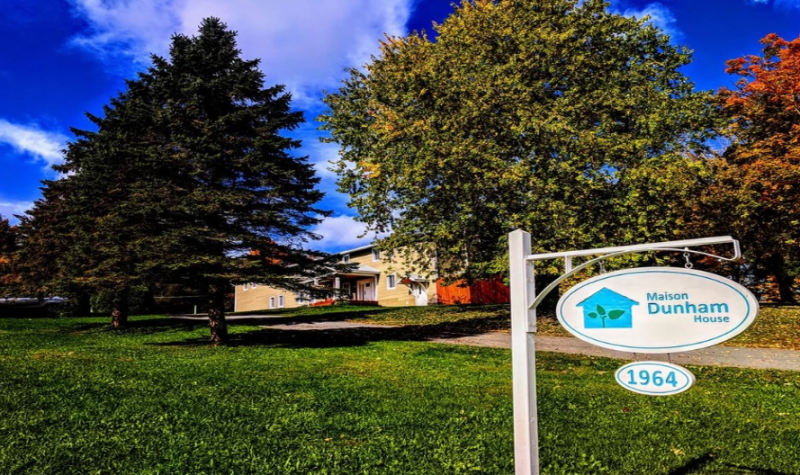This week is Canadian Mental Health's Association's National Mental Health Week. Centre l'Élan and Dunham House are two local organizations which have experienced an increase in demand for their services over the last couple of years as the pandemic created a shift in the state of people's mental health. They say it's a challenge to access alternative mental health resources in the Eastern Townships outside of the public healthcare system , and the situation needs to be addressed.
Centre l'Élan is a community centre and resource that focuses on creativity and art therapy to help individuals going through a difficult period with their mental health. Dunham House is a residential treatment facility, and the only facility of its kind in Quebec that operates in English, for those living with mental health disorders and concurrent disorders, such as addiction.
While there are other mental health resources in the region, such as Mental Health Estrie and Association d’entraide en santé mentale L’Éveil de Brome-Missisquoi, both groups emphasized they are far and few in-between.
“We’ve noticed an increase of almost 30% in demand during and after the pandemic. In numbers we obviously see that the needs are very huge. That has encouraged us to see how we can offer better and give better access to people,” said Martine Chiasson, director of Centre l’Élan. “For Centre l’Élan, it’s so important that when somebody makes a call to get help we want to give a quick answer. (…) We have managed to keep our capacity to respond quickly to the demands, but it’s because we added more employees and adapted the structure to make sure there is always a place for a person.”
Chiasson added that “it can’t be denied” that the needs have grown, especially with the isolation created by the pandemic that dramatically impacted the state of people’s mental health.
“The way it changed, I could say the intensity of the need. People maybe wait and when they come in it’s because it’s really time that they need support. Feeling isolated is something that seems to be becoming something widely experienced. I think what has changed is that the people that come in, for a lot of them it’s a new experience,” she explained. “The pandemic has made the symptoms much more intense. (…) They never had issues before with things that they dealt with and they are kind of surprised like ‘omg I really need help right now and I didn’t expect it.’ In the last month it kicked in.”
While there are alternative services that exist to support people in their mental health journey, Chiasson noted that there is a lack thereof, especially when it concerns the English-speaking community. Centre l’Élan offers different services in English and it adapts its group activities for English-speakers that want to participate.
“I think that every resource should make an effort to offer the most as possible. In reality, it’s all about finances of course. If we had more money we would have groups in English. We’ve tried in the past, but the thing is there is no financial assistance for specific activities that would permit us to offer specific groups in English,” noted Chiasson. “I know there are services for the English-speaking community, Mental Health Estrie for example. (…) I’m hoping there are more services offered now, but I must admit I don’t really know. But I do know that the needs are there and that’s why we want to make everything possible to reach out and answer."
Anthony Berger, clinical supervisor at Dunham House, echoes Chiasson’s concerns as the demand at Dunham House continues to grow. He noted that it’s important to highlight National Mental Health Week to raise awareness and to reduce stigma, but he believes that there needs to be concrete action to implement alternative resources for people living with a mental health disorder.
“I have to say that in terms of services, we are noticing that there is a lack thereof. Building the awareness is one thing, but really what we are trying to see is where people can go when they are struggling with their mental health, what are some tips and tricks that they can use,” explained Berger. “Right now, outside of local CLSCs with very long wait lists, there’s very few options for the variety of needs of mental health, especially in the Eastern Townships.”
Recognizing that not everyone is fortunate enough to access the services provided by Dunham House, which offers a variety of therapeutic activities to its clientele, Berger said that there needs to be “a little bit more diversity in terms of services for mental health” that goes beyond speaking to a CLSC worker or a psychologist on a sporadic basis.
“I think the alternative activities and the alternative coping strategies that exist besides talk therapy is a bonus. I think there needs to be some awareness, workshops, or support groups, that foster those type of modalities. For some people that struggle, just talking about their issues is difficult. If they can incorporate things through art, through music, and also just being in nature, like going on walks, it’s really beneficial,” he emphasized.
“More and more now people are coming in and they’re asking for art therapies. (…) What’s special about that form of therapy is that it touches the creativity of the person. Most of the time when we are having mental health issues or we aren’t feeling well, people don’t often have the reflex to reach out to their creative potential. When we give access and nourish that way of reaching within, it sort of gives tools that are unexpected and it takes us away from our thoughts and intellectual way of dealing with our issues,” noted Chiasson.
National Mental Health week takes place from May 1 to May 7. According to the Canadian Mental Health Association’s website, this year’s theme is #MyStory to highlight the importance that storytelling plays in supporting mental health and reducing stigma.


